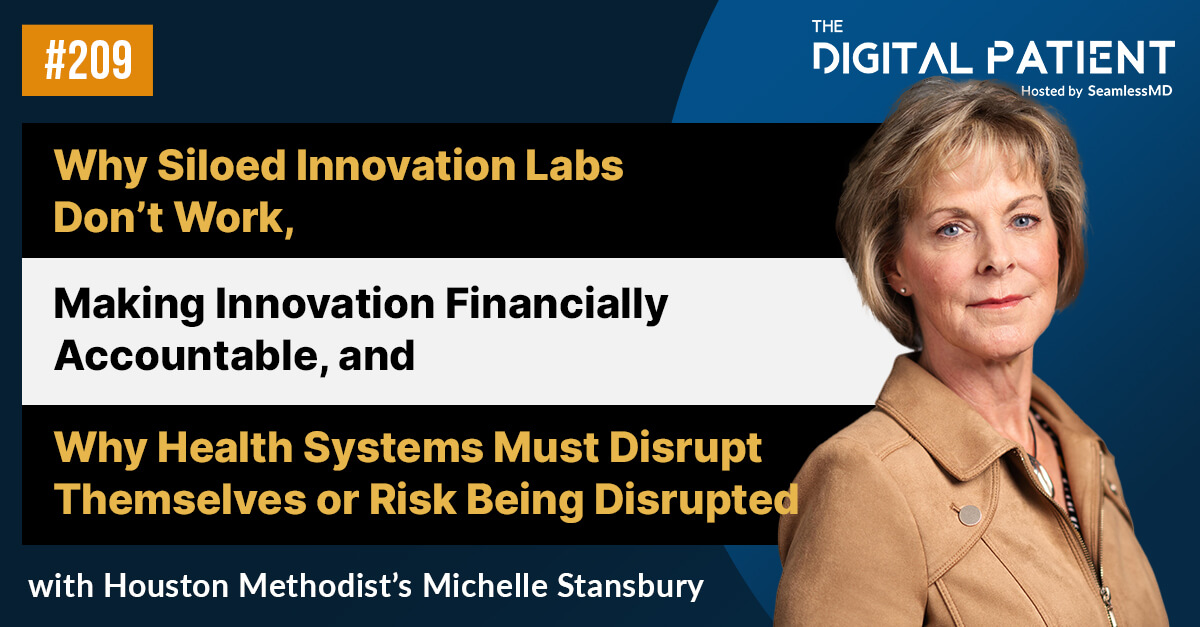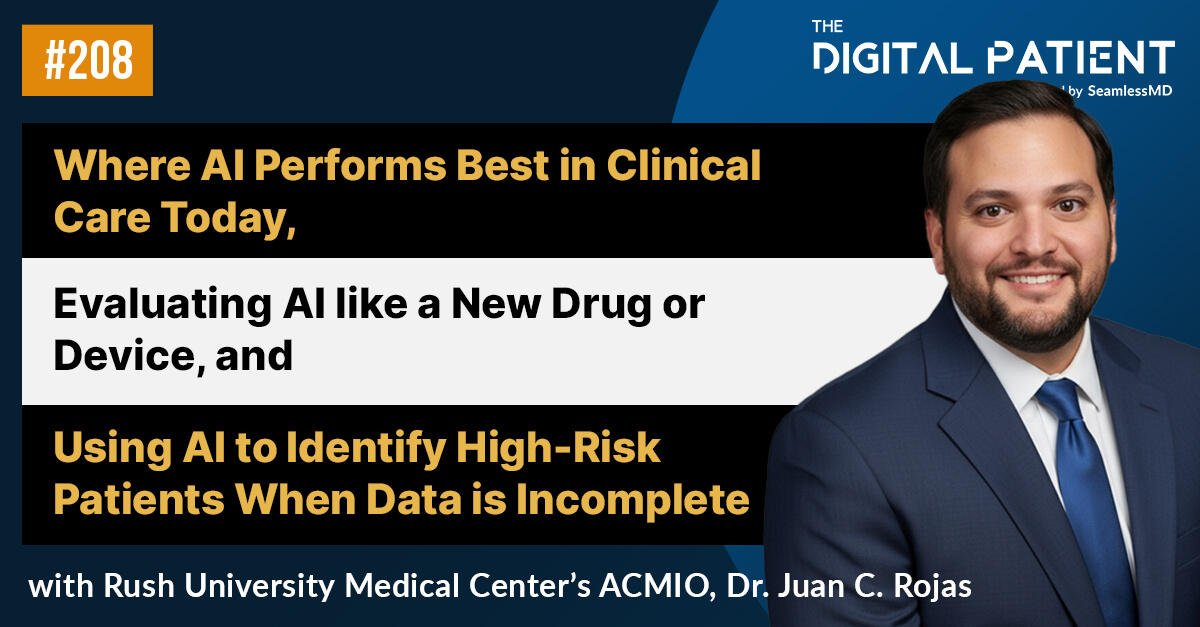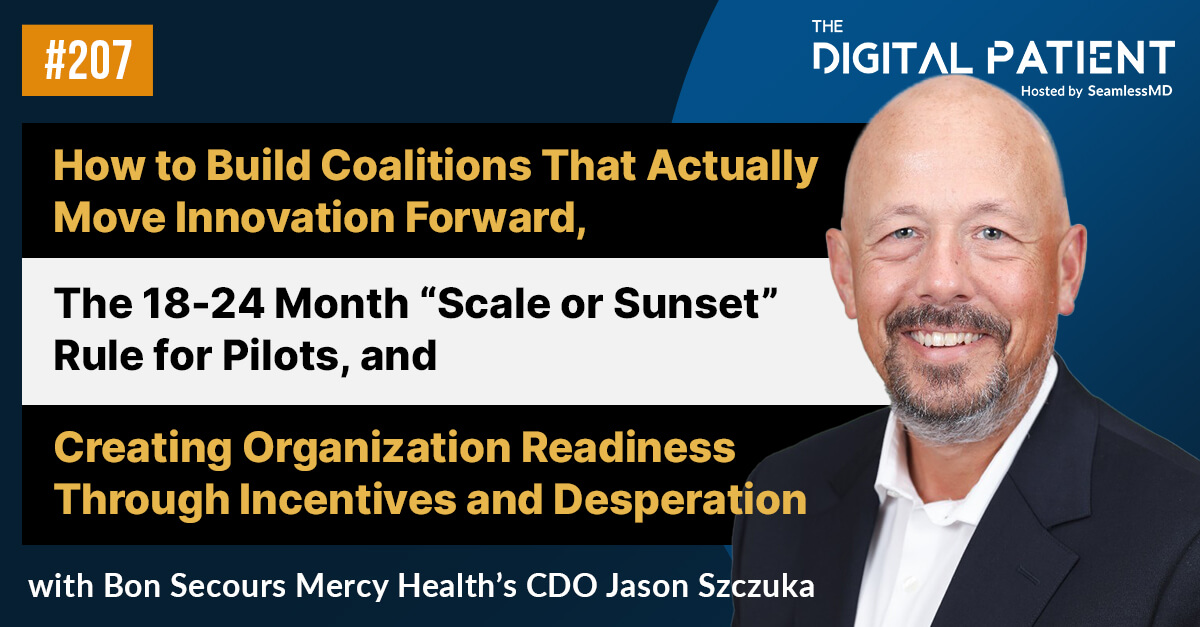Subscribe on: RSS | SPOTIFY | APPLE PODCAST | GOOGLE | BREAKER | ANCHOR
Audio:
Video:
In this episode of the SeamlessMD Podcast, Dr. Joshua Liu, Co-founder & CEO at SeamlessMD, and marketing colleague, Alan Sardana, chat with Dr. Carmine Simone, thoracic surgeon and Vice President of Clinical Programs at Michael Garron Hospital (MGH), Medical Lead for Covid Response at MGH, Medical Director for Integrated Programs for Sunnybrook Health Sciences Centre and MGH, and Associate professor in the Department of Surgery at the University of Toronto. See the full show notes below for details.
Guest(s): Dr. Carmine Simone (@CarmineSimon), thoracic surgeon and Vice President of Clinical Programs at Michael Garron Hospital (MGH), Medical Lead for Covid Response at MGH, Medical Director for Integrated Programs for Sunnybrook Health Sciences Centre and MGH, and Associate professor in the Department of Surgery at the University of Toronto, Dr. Joshua Liu (@joshuapliu), Co-founder & CEO at SeamlessMD
Episode 48 – Show notes:
[0:00] Introducing Dr. Carmine Simone, thoracic surgeon and Vice President of Clinical Programs at Michael Garron Hospital (MGH). He is also the Medical Lead for Covid Response at MGH and the Medical Director for Integrated Programs for Sunnybrook Health Sciences Centre and MGH. He is an Associate professor in the Department of Surgery at the University of Toronto, and his research focus is on developing systems to predict and prevent postoperative complications;
[1:06] Why Dr. Simone believes MGH encourages innovation by following the “3 L’s”:
- Leadership (forward-thinking individuals);
- Learners (academic-oriented individuals such as medical students, residents, nursing faculty); and
- Letdowns (turning unsuccessful situations into the desire to do even better);
[6:00] How Dr. Simone recognized in 2014 that many patient problems could be more efficiently dealt with remotely, through the use of SeamlessMD’s Digital Patient Engagement platform. By enhancing patient engagement and satisfaction, this reduces the amount in-person care required and creates more staff availability;
[10:23] Why Dr. Simone chose to be in the patient education videos, as it adds an element of personalization and ultimately allows patients to feel more trusting of the information that they are being presented with;
[14:20] Why Dr. Simone feels that SeamlessMD is highly beneficial toward more complex and less common surgeries, such as thoracic surgery. This is because specific surgery-related questions and information is covered on the application, reducing the need for family physicians to answer questions on topics they may feel less familiar with;
[18:25] Why Dr. Simone was motivated to grow into more healthcare leadership roles throughout the COVID-19 pandemic, and recognized the necessity of reaching out to partners in the community to build a consistent structure around supporting patients through collaboration;
[25:10] How Ontario’s health care system could improve through stronger collaboration efforts and unification, which has been done in the past through the creation of a virtual East Toronto health team where information and resources are shared between physicians;
[32:40] How SeamlessMD has helped to reduce the surgical backlog by providing the tools to ensure patients are properly educated and prepared for their procedure to reduce the likelihood of no-shows, and improving clinical outcomes such as reducing LOS;
[37:33] How virtual care solutions have changed patient expectations for care, and how patients will continue to prefer that certain aspects of their care journey (e.g. pre-op preparation, review of results, post-op tracking) remain virtual even post-pandemic;
[43:09] How Dr. Simone predicts that the evolution of virtual care over the next 3-5 years will be dependent on whether the population chooses to adapt and adopt what is currently available. Furthermore, he believes once the technology becomes more commoditized, more types of care will be delivered from home in the future.
[46:40] Why Dr. Simone thinks that when advising a patient on if they can receive care at a distant institution, the clinician needs to be honest and transparent about if the level of risk involved and the likelihood of complications is worth subjecting a patient to fragmented care versus receiving care locally;
[30:43] Fast Five / Lightning Round Questions
Q1: What is your favourite book or book you’ve gifted the most?
“We Are All Perfectly Fine,” by Jillian Horton.
Q2: How has an apparent failure set you up for greater success?
“I applied for a job in my 4th year of undergraduate at AstraZeneca in Mississauga for a supervisor role and I didn't get it... that’s why I went to grad school and then medical school.”
Q3: Would you rather have super strength, super speed or the ability to read people’s minds?
“Read people’s minds.”
Q4: What is something in healthcare you believe that others might find insane?
“The only people on the planet that still use pagers are physicians.”
Q4: Pandemic-related - What is 1 hobby or activity you’ve gotten into since the pandemic?
“I got a Peloton bike.”
.svg)










.png)
